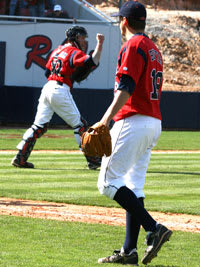Trust, track record important in pitch selection

OXFORD, Miss. - Christian Trent has thrown approximately 1,500 pitches - a mixture of fastballs, breaking balls and changeups - this season. None of them have been his decision.
Head coach Mike Bianco calls the pitches for the Ole Miss staff, and Trent says he hasn't shaken Bianco off a single time all season. Bianco said he can't think of once it's happened with Trent out there.
Advertisement
"No, not a one," Trent said.
The sophomore is 9-0 with a 2.21 ERA and may start Ole Miss' College World Series opener against Virginia, so the system is clearly working. But it's not just a one-player or one-year thing.
Bianco has used this system since arriving in Oxford and routinely puts out some of the best pitching numbers in the Southeastern Conference. While catchers can offer changes and pitchers can shake him off to another pitch or location, they rarely do. The reason is pretty simple: They trust him. Bianco has the stats, the reports and the history of handling it well.
"I have all the information in front of me," Bianco said. "It's not that I know more than Chris Ellis or Trent. That would be stupid… and I wouldn't tell them to shake off if that's the case… Also it take a lot of pressure off them. It's my decision so if it gets hit then so be it, it's on me.
"We're all on the same team. It's not I'm right or they're right, it's get the guy out. The only thing we ask is if you shake off, I'm never going to get mad at you, but I may ask you why."
The "why?" question is a learning tool - for both player and coach. The players are forced to think about the reasoning and have a constructive debate, while Bianco needs to know if he's missing something. Golden Spikes runner-up and current A's starter Drew Pomeranz would change the pitch or the direction because of something Bianco couldn't see from the dugout.
If a batter moved away from the plate slightly or changed position, Pomeranz would adjust the pitch call accordingly once it came from Bianco. They'd talk about it afterward and be on the same page with the plan moving forward in the game.
Bianco said it's the three-pitch of four-pitch players who have shaken him off the most over the years. Pitchers have more feel with the fastball or can't find the breaking ball release point for an inning or two, so the plan shifts accordingly.
Brett Basham, Ole Miss' catcher from 2007-2010 and 2008 All-SEC Defensive team member, remembers the opposite when it comes to a pitcher who changed the pitch call. He named Scott Bittle as the most-likely culprit to mix things up.
Bittle was known for his devastating cutter, nicknamed "The Thing," as he used it to baffle hitters in starting and relief roles during his career. But the right-hander also had a fastball that hovered between 90-92 MPH. The two-pitch mix and Bittle's confident personality made it difficult for Bianco to lock in on what his pitcher wanted to do.
"B wanted him to throw the cutter because it was so good, but Scott would say he needed to throw the fastball at some point because it was good, too. So he'd shake to fastball. Then when we called a fastball, he'd shake to the cutter and say, 'I've got the best pitch in the country.' With Bittle, pitch call was just a suggestion.
"Some people were afraid to shake and give something up. Bittle didn't care."
Fans are fast to jump on Bianco's system as micromanagement when things aren't going well. Despite the history of quality SEC pitching essentially every season, the question of whether the program does enough to develop catchers routinely emerges during a losing streak or a bad game.
"One of the misnomers about calling pitches is the catchers don't learn, and I think it's the total opposite," Bianco said. "The catchers learn a system, rather than putting down pitches and trying to guess what the hitter is thinking. That's not what it's about. Plus a lot of times we're pitching to our strengths. We want the tendencies in front of us, but truth of the matter is Ellis usually pitches the same way each time… It's more about who is on the mound and what they do to be successful."
Basham said after a couple years he knew what pitch was coming before Bianco sent it his way. He understood the pitchers and how each game would be handled based on opponent and starter. Bianco gave Basham more control over time.
"I had freedom," Basham said. "That's pretty indicative of every catcher. The more comfortable we got, the more I control I had out there. It's the same thing with Will (Allen). I see him and B working out there. I can watch on television and see a lot of things they are relaying back and forth every pitch."
Ole Miss' system for calling pitches is similar at most major programs around the country. Just like with the Rebels, responsibility for the players depends on experience level and situation. The most important aspect is the pitchers believe in their head coach. The proven track record delivers confidence and takes an element from the players, so they can concentrate on execution.
"It's like how Hugh Freeze calls the play, and the quarterback can check at the line," Bianco said. "He saw something different. It's not about ego… It would be scary if I'm calling pitches and getting shook a lot. Either they don't trust me, or I'm not good at it.
"We all work together. Get the guy out. Move on and do it again."